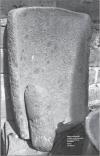Resumo
Os vestígios prehispánicos são objetos sociais do presente porque é nesta dimensão temporária onde se recorda eelabora o passado, reconstruído segundo os termos da sociedade que os inclui em seu universo material e simbólico.No caso das sociedades rurais as idéias autóctones sobre o passado e suas evidências materiais se transmitemoralmente e evocam a memória social do grupo que as reproduz, compartilhando-se por meio de saberes tradicionaisque representam significados locais sobre os vestígios. O seguinte artigo expõe os avanços de uma investigaçãoque tem como fim angariar ditos significados entre os habitantes de Teuchitlán, no Ocidente de México. A informaçãocoletada até agora conforma um registo de relatos e mitos elaborados pelos residentes de uma região onde os contatoscotidianos com os objetos e ruínas prehispánicos, forjaram um corpus de conhecimentos nativos que orientama interação das pessoas para com esses objetos.La revista Apuntes se encuentra registrada bajo la licencia Creative Commons Reconocimiento 4.0 Internacional. Por lo tanto, esta obra se puede reproducir, distribuir y comunicar públicamente en formato digital, siempre que se reconozca el nombre de los autores y a la Pontificia Universidad Javeriana. Se permite citar, adaptar, transformar, autoarchivar, republicar y crear a partir del material, para cualquier finalidad (incluso comercial), siempre que se reconozca adecuadamente la autoría, se proporcione un enlace a la obra original y se indique si se han realizado cambios. La Pontificia Universidad Javeriana no retiene los derechos sobre las obras publicadas y los contenidos son responsabilidad exclusiva de los autores, quienes conservan sus derechos morales, intelectuales, de privacidad y publicidad.
El aval sobre la intervención de la obra (revisión, corrección de estilo, traducción, diagramación) y su posterior divulgación se otorga mediante una licencia de uso y no a través de una cesión de derechos, lo que representa que la revista y la Pontificia Universidad Javeriana se eximen de cualquier responsabilidad que se pueda derivar de una mala práctica ética por parte de los autores. En consecuencia de la protección brindada por la licencia de uso, la revista no se encuentra en la obligación de publicar retractaciones o modificar la información ya publicada, a no ser que la errata surja del proceso de gestión editorial. La publicación de contenidos en esta revista no representa regalías para los contribuyentes.


